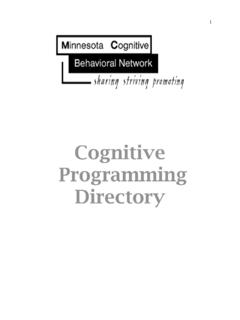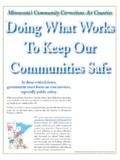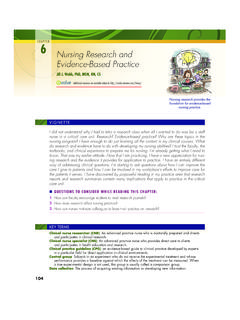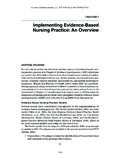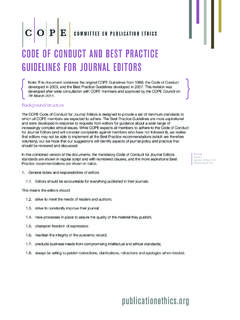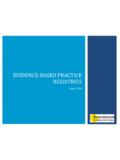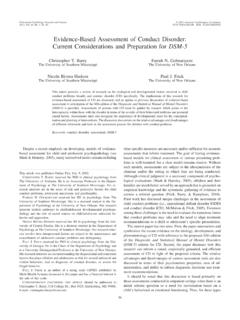Transcription of Evidence Based Specialists Corrections …
1 Evidence Based Specialists Corrections Programming and Training Driving With Care Facilitator Training, October 2 & 3, 2012. ASUDS Assessment Training October 4, 2012. Authors: Wanberg, Milkman and Timken About Evidence Based Specialists Evidence Based Specialists was founded on the philosophy that the Corrections community has the research and tools available to make a significant positive impact on the offender population we serve. Evidence Based Specialists (EBS) is committed to helping agencies achieve that impact through quality training, programming and services that adhere to the principles of Evidence Based correctional practices to reduce recidivism. EBS promotes positive change within agencies, professionals and offenders.
2 Professionally trained and endorsed by the authors of Driving With Care (DWC) program, be assured that the trainers of the DWC curricula are uniquely qualified to meet your agency's DWC training needs. Please visit for more information. Driving With Care . Training Process- Driving With Care The Driving With Care training consists of two consecutive days of experiential exercises coupled with lecture. Background, theoretical orientation, and a brief literature review, all with an emphasis on the Cognitive Behavioral model of learning and change, and motivational enhancement are presented. The protocols detailed in the participant's workbooks are reviewed, along with information from the provider's guide. Each participant will briefly present one of the Level II Therapy sessions to the training group.
3 Feedback will be provided by the trainer(s) as well as by group members. Attendance and participation is required in all portions of the training in order for a certificate to be issued. The trainers reserve the right to determine whether the trainee will earn a DWC training certificate. Dates, Times and Location The facilitator training will be held on October 2nd and 3rd, 2012 from 8:30 to 5 The training will be held at 8120 Penn Ave S., Bloomington, Minnesota. Office (612) 216-5376 Fax (612) 216-3763 Programs Traditional alcohol and other drug (AOD) related highway safety programs have been mainly educational, utilizing passive-participant (didactic presentations, films, etc.) program models. There is Evidence that this more traditional approach has not been effective in reducing repeat offending or recidivism.
4 Conversely, there is Evidence that a cognitive-behavioral approach to changing behavior has been effective in treating clients with a history of substance abuse and criminal conduct. The Driving With Care (DWC) program focuses on changing thinking, attitudes, and behaviors that lead to driving while having a measurable presence of alcohol or other drugs in the body and brain. The focus is on cognitive- behavioral self. The more traditional alcohol and drug related driving safety programs have focused on AOD relapse prevention; the DWC program also focuses on recidivism prevention - or the prevention of illegal conduct as defined in AOD impaired driving statutes. There are a number of Correctional agencies in Minnesota that have implemented the Driving With Care.
5 Program to address the high volume of probationers being supervised for DWI related offenses. The list includes, but is not limited to, Anoka County, Brown County, Dakota County, Carver County, Hennepin County, Ramsey County, Scott County, St. Louis County and Washington County. Although recidivism outcomes have not been determined, the overall response by agencies, facilitators and participants has been very encouraging. Because Driving With Care adheres to the principles of Evidence - Based group cognitive skills models of programming, outcomes and effects are likely to be similar. The following programs allow an agency to address a number of needs concerning DWI offenders: Level I Education This is a six-session, 12-hour DWI education program for first time offenders who indicate minimal if any problems associated with AOD use, other than impaired driving, who have no prior offenses, no prior diagnosis of Substance Abuse or Substance Dependence, and no other problems related to AOD use or misuse.
6 The focus of this protocol is to prevent recidivism into DWI behavior and to prevent future AOD. related problems. Level II Education This is a 12-session, 24-hour education program for persons who are repeat offenders convicted of driving with a blood alcohol level beyond the legal limit and/or while under the influence of another drug. The program is built on the philosophy that offenders make changes in their actions by changing how they think. This program will give offenders knowledge and skills needed to change their thinking so they may change their actions and prevent future DWI's/DUI's. Level II Therapy Level II Therapy is a 21-session, 42-hour program including 10 manual-guided therapy projects. Level II. Therapy assists in developing and implementing individualized treatment plans.
7 It is designed for clients with higher levels of AOD disruption and psychosocial problems who are in need of treatment and intervention over longer periods of time. The program builds on the core concepts and ideas of DWC. Education with a more intensive and therapeutic approach. Office (612) 216-5376 Fax (612) 216-3763 Provider's Guide The Driving With Care (DWC) Provider's Guide presents a comprehensive view of cognitive-behavioral treatment for impaired driving offenders; a thorough review of theory and practice related to client evaluation, legal and cultural considerations, as well as operational procedures for assessing and matching DWI offenders to appropriate levels of education and treatment services. Guidelines are provided for developing individualized treatment plans, and implementing appropriate education and treatment curriculum protocol where clients relate and apply the lesson and session material to their own unique circumstances and situations.
8 The Provider's Guide help the facilitator learn how to assist clients in learning self-control over thinking and actions, and responsible behavior towards others and the community. Consultation Evidence Based Specialists offers contracted consultation services for Evidence Based practice implementation as well as DWC programming consultation. Quality assurance site visit contracts are also available to provide unbiased, documented feedback to your agency and facilitators. Training Costs The cost per participant is $ for the two day training. The cost will include copies of the following manuals; DWC Level I, Level II, and Level II Therapy. It is strongly encouraged that all those intending to facilitate DWC groups order and become very familiar with the participant's guide.
9 The link for the Provider's Guide is Note: Once you have completed this two day training, you will be qualified to teach the Driving With Care programs. If someone from your agency would also like to teach these programs, they would also need to attend this training. ASUDS. Training Process- Adult Substance Use and Driving Survey- Revised (ASUDS-R). The ASUDS training consists of one day of experiential exercises coupled with lecture. The ASUDS-R is a 123 item psychometric- Based , self-report, differential screening instrument, designed and normed for impaired driving offenders. It is appropriate for clients 16 years or older, and may be administered by self-report or interview format. The ASUS-R meets the needs of a self-report instrument that is an essential component of a convergent validation approach to the assessment of patterns and problems associated AOD (alcohol and other drugs) use within impaired driving populations.
10 The ASUDS-R. contains all of the scales of the Adult Substance Use Survey-Revised. Office (612) 216-5376 Fax (612) 216-3763 The ASUDS-R assesses an individual's AOD use involvement in ten categories of drugs, and measures the degree of disruption that might result from the use of these drugs. Three supplemental scales provide a differential assessment of disruptive AOD use outcomes which are subscales of the general DISRUPTION. scale. The ASUDS-R provides a specific measure of the degree of involvement in the use of alcohol, and a specific measure of driving-risk attitudes and behaviors. There is an AOD use benefits scale. It also provides a screen for emotional or mood adjustment problems, a measure of social non-conformity, a measure of legal con-conformity, a measure of defensiveness or resistance to self-disclosure, and a scale to assess motivation and readiness for treatment.



